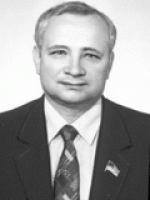Mykola Dzyuba
This article relies largely or entirely on a single source. (December 2024) |
Mykola Dzyuba | |
|---|---|
Микола Дзюба | |
 | |
| People's Deputy of Ukraine | |
| In office 15 May 1990 – 10 May 1994 | |
| Preceded by | Position established |
| Succeeded by |
|
| Constituency | Kyiv, Obolon |
| Personal details | |
| Born | Mykola Hryhorovych Dzyuba 12 November 1946[1] Suvyd, Ukrainian SSR, Soviet Union (now Ukraine)[1] |
| Political party | Independent[1] |
| Other political affiliations | |
| Children | 2 |
| Military service | |
| Allegiance | Soviet Union |
| Branch/service | Soviet Army |
| Years of service | 1965–1968 |
Mykola Hryhorovych Dzyuba (Ukrainian: Микола Григорович Дзюба; born in 12 November 1946) is a Ukrainian former politician who was People's Deputy of Ukraine from 1990 to 1994, representing Obolon, Kyiv.
Biography
[edit]Mykola Dzyuba was born on 12 November 1946 in Suvyd, Kyiv Oblast to a family of peasants. He is an ethnic Ukrainian.[1]
He graduated from high school[vague].[1]
In 1964, he worked as a fitter-plumber in a military unit 55372 of the Soviet Army.[1]
In 1965, he entered the Soviet Army.[1]
In 1968, he became the driver of ATP 13070, in Kyiv. After leaving the army, he joined the Communist Party of the Soviet Union the same year, where he had been part of the Supreme Soviet multiple times.[1]
In 1986, he was a participant in liquidation of the consequences of the Chernobyl nuclear disaster.[1]
In March 1990, Dzyuba was nominated as a candidate for People's Deputies for the elections of the Verkhovna Rada, by the conference of the Minsk District Committee of the Trade Union of Education and Science Workers.[1]
On 18 March, Dzyuba was elected as a People's Deputy of Ukraine for Obolon, Kyiv, through the 2nd round, with 42.53% of the votes. He was one of three candidates, and represented the anti-communist Democratic Bloc.[1] He officially took office on 15 May. He was the head of the subcommittee on issues of development of the service sector, secretary of the Commission of the Verkhovna Rada of Ukraine on issues of social policy and labor.[1]
In March 1994, despite having nominated by voters, he declined to reelection, thus withdrawing the candidacy. By the same year, he had been the referent-consultant of the President of the International Foundation for Humanitarian and Economic Relations of Ukraine with Russia.[1]
Family
[edit]He is married and has 2 children.[1]
